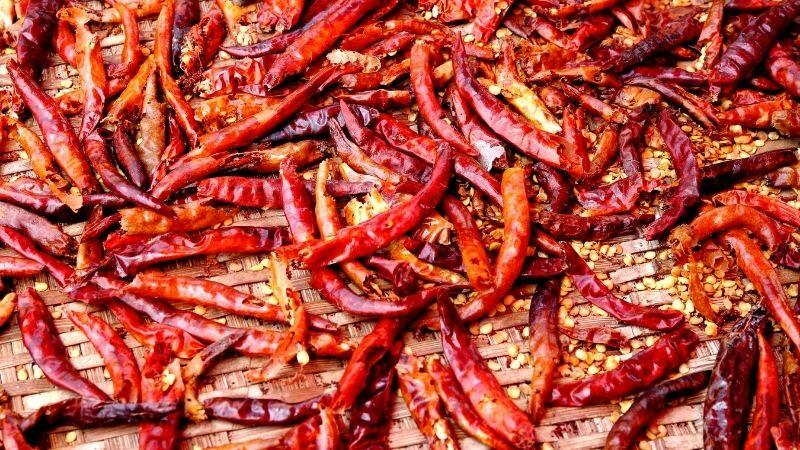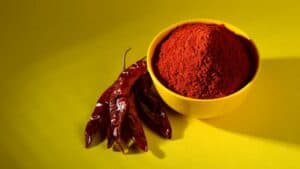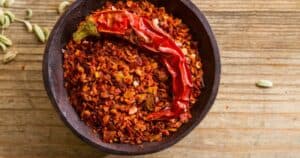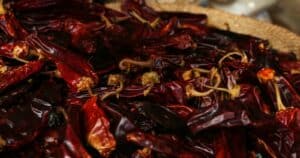Peppers come in many shapes, sizes, and heat levels. As a
The answer depends on how you define “hotter.”
When it comes to sheer spicy intensity, dried peppers win. They contain higher concentrations of capsaicin, the chemical that creates heat. Drying causes peppers to shrivel, cramming more capsaicin into less space.
But don’t underestimate fresh peppers! Though lower in capsaicin, their moisture helps spread heat around your mouth. You’ll taste
This article explores the science behind pepper heat. You’ll learn:
- Why drying makes peppers hotter
- How fresh peppers distribute
spice more effectively - What impacts pepper heat levels
- How cooking changes pepper kick
Armed with this knowledge, you can pick the right pepper for your desired slice of spicy heaven. Let’s dive in!
Why Dried Peppers Taste Hotter?
The chemical capsaicin causes pepper heat. As peppers ripen, capsaicin concentration increases. Drying shrinks peppers, upping capsaicin density. So dried peppers often beat fresh for pure spiciness.
Dried Peppers Have More Capsaicin
Several factors boost capsaicin levels in dried peppers:
- Ripening – Left longer on vines, dried peppers ripen more. Riper peppers have higher capsaicin.
- Oil-based – Capsaicin is oil-based and doesn’t dissipate when dried.
- Shrinking – Drying causes water loss and shrinking. This further concentrates capsaicin.
For sheer spicy intensity, dried peppers win over fresh.
Why Fresh Peppers Taste Hotter
Despite lower capsaicin levels, fresh peppers can taste hotter. How? Moisture spreads capsaicin around your mouth. You feel
Water Disperses Capsaicin
When chewing a fresh pepper:
- Capsaicin mixes with pepper’s natural moisture.
- This mixture spreads throughout the mouth.
- You sense spiciness on all taste buds.
So fresh peppers distribute their less concentrated heat more effectively. This creates an overall hotter sensation.
Why Peppers Sometimes Lack Spice
Ever get a dud pepper with no zing? Several factors influence heat levels:
Pepper Type
- The Scoville scale measures pepper spiciness.
- It ranges from 0 (bell pepper) to over 2 million Scoville Heat Units (SHU).
- For more heat, choose peppers with higher Scoville ratings.
Watering Issues
- Too much or too little water reduces spiciness.
- Let soil dry between waterings and avoid drought.
- Wait until after fruit sets to restrict water.
Climate
- Peppers grow hotter in warm climates, especially with warm nights.
- Cooler regions produce milder peppers.
- Heat helps peppers synthesize more capsaicin.
How Cooking Affects Pepper Spice
Cooking doesn’t majorly impact spiciness. But some techniques enhance or reduce heat.
Spice Level Stays Similar
- Cooked and raw peppers have comparable heat.
- For replacing fresh with dried: Use 2 dried peppers per 1 fresh pepper.
- Dried peppers add smokiness.
Moisture Boosts Spice
- When cooking in liquid, fresh peppers get hotter.
- The moisture spreads capsaicin like in raw fresh peppers.
- Dried peppers retain their concentrated heat.
FAQ
Are dried chilies hotter than fresh?
Yes, dried chilies contain more concentrated capsaicin than fresh. But they don’t distribute it as effectively in the mouth.
Does drying peppers increase heat?
Drying makes peppers hotter through:
- Longer ripening time
- Loss of moisture
- Pepper shrinkage
All increase capsaicin density.
How much dried chili equals fresh?
Use about 2 whole dried chilies for every 1 chopped fresh chili. Adjust amounts to suit your taste and the dish.
Can you rehydrate dried peppers?
Yes. Soak dried peppers in warm water for 30 minutes to several hours until softened. Then use as fresh peppers. Rehydrating dilutes capsaicin and reduces heat.
Key Takeaways
- Dried peppers have concentrated capsaicin but don’t distribute it well.
- Fresh peppers spread capsaicin for full-mouth heat.
- Riper, oil-based, and shrunken peppers are hotter when dried.
- Moisture, pepper variety, climate, and watering affect spiciness.
- Cooking doesn’t majorly impact heat levels.
Now you know how to pick peppers with the right
Sources





